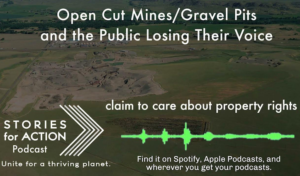By Anne Hedges
Last session, the Legislature struck a blow to people across the state who live near gravel resources. The Legislature passed a new law that directed the State Department of Environmental Quality to allow developers to run roughshod over the rights of individuals who live in unzoned areas. Since most of Montana is unzoned, that means that just about any Montanan could wake up to a large mine and asphalt plant being developed within spitting distance of their property without ever being notified in advance. The stories of impacted communities are piling up.
Madison Valley
When the Legislature passed the law in 2021, it failed to consider the rights of the folks in the Madison Valley who are facing a 50% expansion of an existing
mine. There was little-to-no opportunity for public involvement before state agencies issued a new lease for the land, or before issuing air and mining permits that allow an asphalt plant, concrete and asphalt recycling plants, wash plant, and crushing equipment to operate through December 2042. The mine, near the Madison River and an arctic grayling release site, will impact nearby residences and businesses, harm water quality and wildlife habitat, and increase air, noise and light pollution for people living in the area.
Arlee
Folks near Arlee find themselves near a proposed 157-acre mine and asphalt plant, concrete and asphalt recycling plants, wash plant, and crushing equipment. The mine could remove up to 1 million yards of gravel resulting in 80,000 gravel truck loads on the small local roads near people’s homes and businesses, creating dust and traffic and water related issues in an otherwise peaceful rural area. This proposal also threatens the tranquility of the Garden of A Thousand Buddhas, known throughout the region as a meditative getaway.
Libby
In Libby, residents who have lived in the area for years now find themselves living next to a 14-acre pit until at least 2052. People living near the mine are distraught over impacts to their water resources, increased dust, noise and light pollution, and decreased property values. The operator is already requesting an amendment to allow him to use a road that was supposed to be a berm between the mine and neighboring landowners as another access route. Neither expansions nor a change in post-reclamation land use require any notification of neighbors.
Ravalli, Yellowstone, Park…
Finally, the Legislature simply never considered people in Ravalli County, Yellowstone County, Lewis and Clark County, Park County, or dozens of other locations where people can suddenly find themselves living next to a proposed or newly operating mine. Instead, the Legislature only considered the gravel pit operators who don’t want to worry about pesky neighbors and their concerns for their community, property or safety.
This session, MEIC intends to work with these communities and more to push the Legislature to restore some of their lost rights, to ensure they have a voice in the permitting process, and to protect their water resources, air quality, and the safety of their communities. This will be a difficult session to ask for such modest changes but considering the harm that has already been caused by the Legislature’s short-sighted law, it’s worth trying to claw back a few rights.
This article was published in the Dec. 2022 issue of Down To Earth.


